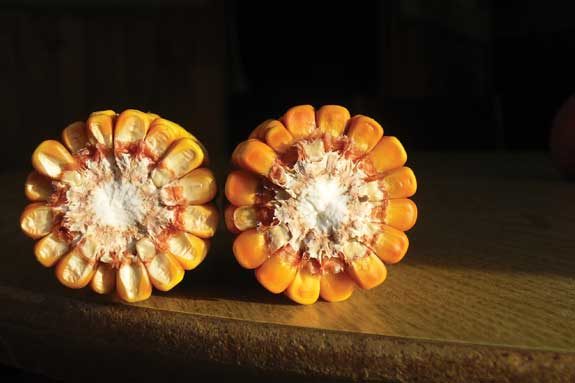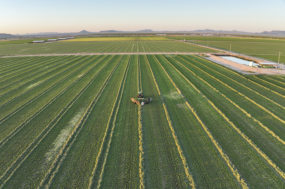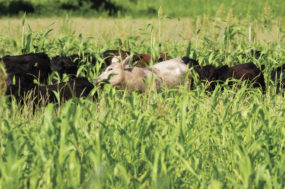However, many impactful changes are being made on a smaller scale.
One of the most impactful advances isn’t taking place on a dairy but rather in a test lab.
New scientific evaluations have created a deeper understanding of the corn kernel and shed light on its various properties. By better understanding the genetic makeup of the kernel, we can begin to profile for traits that will have a positive impact on yield, digestibility, and in turn, milk production.
Kernel physiology: The seed
To produce feed that will aid cows in their milk production, advancements must first be made within the kernel. The corn kernel has evolved over time to protect the seed until conditions are suitable for germination. This helps preserve the starch within the plant, which is essential for cow digestion.
Because starch is such a critical component in milk production, hybrids are profiled for starch. This includes looking for ideal size, density and maturity that are all critical to digestibility. Ideally, particles are smaller in size so they can be broken down more easily. Softer kernels are much easier to break down in order to obtain essential nutrients. Harder starch, such as the flint variety, can pass through undigested, and the nutrients are wasted.
Additional advancements include profiling hybrids for insect resistance and herbicide tolerance to protect plants in the field. Because the plants can better resist insects and diseases, producers can spend less time and money in the field and more time managing their operations efficiently.
The most important impact, however, is that the plant tissue remains healthy. Because the plant is less affected by pests, it is able to provide maximum health benefits to the dairy-producing cow. In turn, plants that encounter problems such as mold and mycotoxins can lower cows’ immune systems, putting them at risk for illness and also reducing metabolism.
Kernel digestibility: The cow
The area where technological advancements pay the largest dividends is within the cow. After all, that is where the milk is made.
To take advantage of the starch-packed kernel, the cow must first break it down and release the nutrients. The cow’s ability to digest its feed properly is essential to maximize its ability to produce milk, stay healthy and minimize waste.
Starch
This is where our new understanding of starch plays a very important role. Scientific advances in starch profiling, along with new tools and techniques, have allowed us to gain better understanding about the type of starch found in different corn kernels.
Soft starch is readily available for an energy source to animals, and each corn kernel has a different starch storage matrix. In simpler terms, the starch is either soft (floury) or hard (flint). Products with a softer starch result in a more floury, opaque, high-moisture corn, while hybrids with harder starch tend to be denser and translucent.
Hybrids that produce soft starch are better designed for ethanol and livestock operations, including dairy. This is because softer starch hybrids have shown a positive effect on milk yields in dairy cows, as well as an increase in ethanol yields. Harder starch hybrids need to be managed differently to obtain all available starch. If not managed well, hard starch will pass through the dairy cow undigested and into manure.
Prolamin-zein
Another factor that greatly affects digestibility within the kernel is prolamin-zein. Prolamins are proteins solely associated with starch in all cereal grains. In corn, prolamin proteins (called prolamin-zein) comprise 30 to 60 percent of the protein in whole corn.
Research shows that corn with lower levels of prolamin-zein are more easily digested. This is because the prolamin surrounds the protein like a plastic bag, making it difficult for the cow to break down.
Again, indigestible feed turns into manure instead of milk. Choosing products with low levels of prolamin-zein allow the cow to easily break down the protein and access the starch which is so essential in milk production. By choosing hybrids with low prolamin-zein levels, you can improve digestibility and increase the vital nutrients that are released.
As producers, our biggest priority should be the nutrition of our products, whether it’s vegetables, milk, meat or eggs. By using practices that produce healthier products more efficiently, we have a positive impact on our bottom line, and more importantly, people’s health.
Too often, we focus on yield as the single factor affecting our profits. Dairy producers especially should be just as concerned with the kernel’s digestibility and nutritional value. By understanding the positive impact different hybrids can have in your herd, you can begin experimenting with different varieties and see an improved return on your investment. FG
PHOTO
Hybrid corn varieties are selected so the germ is wider and deeper. Hybrids contain essential amino acids – methionine, lysine, and tryptophan – increasing digestible qualities. Photos courtesy of Corey Catt.

Corey Catt
Forage Products Manager
Latham Hi-Tech Seeds












